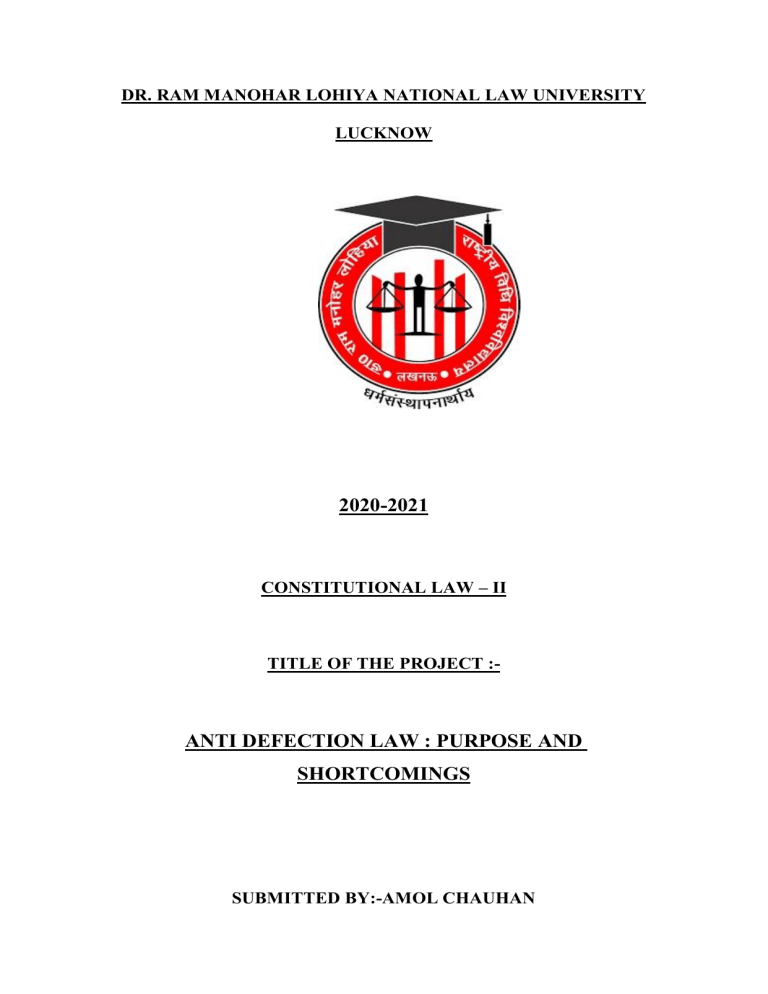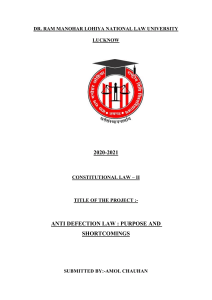
DR. RAM MANOHAR LOHIYA NATIONAL LAW UNIVERSITY LUCKNOW 2020-2021 CONSTITUTIONAL LAW – II TITLE OF THE PROJECT :- ANTI DEFECTION LAW : PURPOSE AND SHORTCOMINGS SUBMITTED BY:-AMOL CHAUHAN ENROLLMENT NO. :-190101020 SEMESTER- 4TH SEMESTER Table of Contents INTRODUCTION ................................................................................. 4 GROUNDS FOR DISQUALIFICATION ............................................ 5 DOES THE ANTI-DEFECTION LAW AFFECT THE ABILITY OF LEGISLATORS TO TAKE DECISIONS? .......................................... 6 EXCEPTIONS IN THE ANTI DEFECTION LAW ............................ 6 AN EPIDEMIC OF DEFECTORS ....................................................... 7 THE PROBLEM OF PARTISAN SPEAKERS ................................... 7 PLUGGING LOOPHOLES .................................................................. 8 CASE LAWS ON ANTI-DEFECTION LAW...................................... 9 RECENT CONTROVERSIES ............................................................ 11 CONCLUSION .................................................................................... 13 BIBLIOGRAPHY ................................................................................ 14 INTRODUCTION Anti Defection law comes under 10th schedule of Indian Constitution. It was enacted by Parliament in 1985 and came into effect on 1st March 1985. This law was enacted because many politicians after winning elections changed their parties either because they were given money or they wanted higher portfolios. A famous quotation was used for them “Aayo Ram Gayo Ram” that is in one moment the person is in one party and in another moment the person is in another party. This nature of politicians proved a threat against the constitution and the very mandate in the eyes of right thinking politicians. There was another angle of this law, the positive angle. If a Member of Parliament spoke against his or her party for a greater good, then to avoid the wrath of the party, the member can shift to another party without losing his or her membership. Due to these reasons a lot of time was invested in debates and deliberations. After long time of deliberation the bill came in 1985. GROUNDS FOR DISQUALIFICATION There are two ground of disqualification as per anti defection law. The first is through voluntary giving up the membership. 1 This is different from resigning because in this a legislator can be seemed to come under anti defection law if the speaker or chairman inferred that the withdrawal was of voluntary nature. The second ground is if the legislator votes against the decisions of the party and the party does not approve of it within 15 days. The third ground is regarding an independent candidate. If an independent candidate wins an election and joins a party after elections then he will face the wrath of Anti Defection Law. The fourth ground is regarding the nominated member. If a nominated member joins a party 6 months after he becomes a member of parliament then he is liable for defection. However, there is an exception. The exception is that if 2/3rd members of a party leave and merge to another party; they would be immune from this law. But this law has seen several phases and has been through amendments. Earlier there was also one exception in this law that if there is a split in the party and 1/3rd members of the party forms another party or group then they will not be disqualified. But with the advent of time this clause was seen as a misuse and was amended and now there is only one exception i.e. of merger which is enshrined in para 4 of Schedule 10 of Indian Constitution. There was confusion about first ground of disqualification about the word Voluntary which was clarified by Supreme Court. Supreme Court held that the presiding officer has to infer the intent of the legislator. 1 Tenth Schedule of the Indian Constitution. DOES THE ANTI-DEFECTION LAW AFFECT THE ABILITY OF LEGISLATORS TO TAKE DECISIONS? The Anti-defection Law aims at providing a stable government by making sure that the members of the assembly do not change their loyalties to their side. But again, this also restrains any legislator from voting in accordance with his judgment, conscience, as well as for the welfare of his constituency. This delays the legislative oversight of the government by ensuring that the members vote not on what the voters want them to vote for, but on the decisions made by the party leadership 2 . The political parties send members of the assembly a guide on how to proceed on almost all topics. This is regardless of the quality of the problem at hand. Most experts think that the law should strictly apply to the specific votes determining government stability (the annual budget passage or the motion for no confidence). EXCEPTIONS IN THE ANTI DEFECTION LAW Members of the assembly may shift their parties under certain conditions without the possibility of disqualification. The statute requires one party to combine with or into another party if at least two thirds of its members are in support of merging. In such a case, no disqualification extends to either those that wish to join or who are with the original party.3 Several committee experts have recommended that the President (for MPs) or the governor (for MLAs) should decide on the advice of the Election Commission instead of the speaker. This would be similar to the disqualification procedure if the individual is in a office of profit (i.e. the person holds a central or state government office carrying a remuneration and is not excluded from the legislature's list). 2 Vibhor Relan, ‘The Anti Defection Law Explained’ (PRSIndia, 6 December 2017)<https://www.prsindia.org/theprsblog/anti-defection-law-explained> 3 Vibhor Relan, ‘The Anti Defection Law Explained’ (PRSIndia, 6 December 2017)<https://www.prsindia.org/theprsblog/anti-defection-law-explained> AN EPIDEMIC OF DEFECTORS The Tenth Schedule (or the anti-defection law) was implemented to curtail the Indian lawmakers' so-called "aaya-ram-gaya-ram" activities. Especially in the 1960s, defection had reached "such epidemic proportions" that several state governments could not be considered stable, resulting in effective governance being implemented. However the Supreme Court in Kihoto Hollohan v. Zachillhu and Others 4(1992) partly struck it down. It was revised with the Constitution (Ninety-First Amendment Act), 2003, again in 2003. Under this rule, if an elected MLA wants to defect to another political party, they can't hold on to their assembly seat any more. The deception arises from the simple failure by speakers to perform their constitutional duties under the law by failing to take a decision on the disqualification of a Member of the Legislative Assembly (MLA) within a reasonable time. It means that an MLA, which has otherwise violated the Tenth Schedule by "Defecting" another political party, will not face the legal consequence of disqualification for such "defection," but will instead continue to enjoy its seat. It effectively makes the anti-defection law obsolete, with disastrous consequences for the constitutional democracy in India. 5 THE PROBLEM OF PARTISAN SPEAKERS The Anti-Defection Act includes many loopholes, there's no easy way to plug them all in. One of the primary problems with this act, and the reason why it does not work as it should, is that the adjudicating power for defecting MLAs has been granted to the House speaker, who will inevitably belong to a political party, and therefore cannot be impartial in his decision. There is always an intense debate about the efficacy of the Anti-Defection Act and the need to amend it to avoid the large-scale defections that have occurred despite the act. 4 Kihoto Hollohan v Zachilhu, A.I.R. 1993 SC 412. 5 V. VENKATESAN,“ Supreme Court dithering on defectors: Anti-Defection Act ”(Frontline,16th Aug 2019) <https://frontline.thehindu.com/cover-story> PLUGGING LOOPHOLES As early as 2014, political parties have used biased speakers to unlawfully lock ministers at their berths. Using the example of Talasani Srinivas Yadav, a Telugu Desam Party (TDP) MLA in Telangana who served in the state cabinet without being re-elected, K Vijaya Bhaskara Reddy shows how there are many loopholes in the Anti-Defection Act that political parties are constantly abusing to hold on to power.6Indeed the anti-defection law enacted by the 52nd constitutional amendment is quite outdated. Major political parties have used the party defection incentive offered by the Tenth Schedule's third paragraph to wreak havoc for some 18 years. The passage of the 91st constitutional amendment repealed this opportunistic clause, which increased the number of members required to form a new group from one-third to two-thirds. Since then the parties in power have started to abuse the broad powers of the office of the speaker in determining disqualification matters. Power of the Speaker of Legislature: In compliance with Rule 6 of the schedule, the House Speaker who is considered Chairman of the House has full power to decide who is to be excluded. One of the major criticisms of this rule is that the speaker does not need to have the experience to make the judgment on the said scenario. 1. Judicial Review: Rule 7 of the schedule states that no court has authority to rule on a house member's disqualification matter only Speaker may decide the case which, as mentioned above, has as many implications as the court's judge is able to do so but the house's speaker is not. This law was questioned several times in court. In Kihoto Hollohan v. Zachilhu and others court held that this rule is valid overall but is unconstitutional on the question of excluding jurisdictions. Under Article 368 of the Constitution, any statute concerning it should be ratified by the State. Articles 136, 226 and 227 of the Constitution and since it had not been ratified by the requisite number of State legislatures, it was declared unconstitutional by the Hon'ble Supreme Tribunal. The Supreme Court has held that the Speaker serves as a tribunal when determining the case and that if there is any wrong decision, the tribunal will review it. 6 Vibhor Relhan, “The Anti-Defection Law Explained”(PRS India,06th Dec 2017) <https://prsindia.org/theprsblog/anti-defection-law-explained > 2. No individual stand on part of members: It can be seen that party leader behaves within the party as dictators. Rule 2 of the schedule obliges the party member to function in compliance with the direction of the party to which he is not autonomous. Whether the move is good or bad, he'll have to work on it otherwise disqualify his member. CASE LAWS ON ANTI-DEFECTION LAW The question of whether the freedom to speech and expression is limited by the 10th Amendment was raised by Kihoto Hollohan v Zachilhu 7. On the charge of defection under the 10th schedule a few representatives of the state assembly of Nagaland were disqualified The Court claimed that it did not affect freedom of expression. In fact, the Court discovered that there were procedural reversals in the statute; firstly, the bill was never adopted by the sufficient number of State legislatures before the President's approval. Secondly, the speaker alone can be detrimental when determining another member's disqualification. Thirdly, the clauses in paragraph 7 had put up a bar on the judicial review. Therefore, paragraph 7 of the Act was abolished by the Supreme Court. The question of whether resignations can constitute "voluntary giving up ," was also raised in Kihoto Hollohan v. Zachilhu's case and this has been dealt with in the Ravi S. Naik v union in India, where the Honourable Supreme Court has decided that the word "voluntary giving up "has to be interpreted more widely. Other issues resolved by the Supreme Court were: • If a person claims to disqualify a member it is the person responsible for proving the disqualification of the member in accordance with paragraph 2 of defection law. • The burden of proof lies with the person claiming a split from the original party, in the case of a merger arising from paragraph 3. Similarly in Keshav Gogoi v Speaker, Assam legislative assembly8 the Court had to complement the ‘Kihoto case’ where it was kept, that judicial review would not be carried out in the earlier stage where the speaker or chairman would have to determine, 7 Kihoto Hollohan v Zachilhu, A.I.R. 1993 SC 412. 8 Keshav Gogoi v Speaker, Assam Legislative Assembly, (1995) 1 Gau. I.R. 359. decide, or intervene with the interlocutory order in connection with the issue of disqualification of any Member. Nevertheless, the jurisdiction of the court cannot be reduced.In G. Vishwanathan v. Speaker, the Legislative Assembly of Tamil Nadu 9 raised a question as to whether a member could voluntarily giving up his membership if he joins another party after being expelled. The Court responded that the mere exclusion from the original party did not remove representation, but merely an unattached assembly member. The judgment's validity is based on the fact that "unattached". In case of Dr Kashinath G. Jhalmi v Speaker, Goa legislative assembly10 the court must deal with the statement that one speaker can review his decision on a members ' disqualification? The answer was negative, because the speaker does not have the authority to examine it as the schedule remains silent. In Jagjit Singh v State of Haryana11, the Court considered the issue of the status of an independent candidate entering a party to determine whether he gave up his independent nature as elected. If such a candidate offers assistance, he cannot be dismissed provided that he does not sacrifice his independent character. 9 G. Vishwanathan v Speaker, Tamil Nadu Legislative Assembly, A.I.R. 1996 S.C. 1060. 10 Dr. Kashinath G. Jhalmi v Speaker, Goa Legislative Assembly, (1993) 2 S.C.C. 703. 11 Jagjit Singh v State of Haryana, A.I.R. 2007 S.C. 590. RECENT CONTROVERSIES GOA CONTROVERSY Defection generally occurs when a party having maximum legislators is just a few seats short of reaching majority. One such case is of Goa. Goa has an assembly with 50 seats. 15 seats were won by Congress. Out of the 15, 10 of them joined Bhartiya Janta Party. Since the number which joined the party was 2/3rd of the members of the party they will not face the whip of AntiDefection law. Another case is that 2 of the 3 members from Maharashtrawadi Gomantak Party left their party and joined the Bhartiya Janta Party. Again as 2/3rd members of the party did it, they were done away with Anti defection law. This situation is being criticized by the opposition. Apart from the disappointment of the congress, it also raises some questions. Is this defection not against the mandate of the people. But anyhow the defection is legal in the eyes of law. With the above example we can see that anti defection law deters an individual but not a group. The defection in Goa teaches us a thing, i.e. now the defection is not limited to an individual but a group and a group is now headed by few individuals in one way or the other. The path leading to defection has changed but is still live in its intent. But as 2/3rd is the requirement and also has been filled in the above example, it can be said that majority of the members of a party are in favour of the decision, thus respecting the intent of the party. KARNATAKA CONTROVERSY In Karnataka assembly a no-confidence motion is to be performed against the Karnataka government. While the process was going to happen several MLAs sent their resignation from their respective parties to the assembly speaker Mr. K R Ramesh Kumar, he didn’t considered their resignation in lieu of the confidence vote that was to be held within a few days. After the no confidence motion is passed against the government the speaker disqualified the rebellious MLAs. This raised the question of the disqualification of members under the Anti-defection law (Tenth Schedule) versus the role of Speaker to accept their resignation. In addition to the disqualification the speaker also banned the MLAs from contesting elections till the time current assembly gets dissolved, i.e., by 2023. This raised another question whether disqualification under Tenth Schedule can lead to a bar upon MLAs to contest by-elections during the tenure of the incumbent Legislative Assembly. This issue then went to the Supreme Court where the Supreme Court upheld the decision of the speaker to disqualify the dissident MLAs but it oppose the decision of the governor that debars the MLAs from contesting by elections. Court said that neither under Anti defection law nor under Representation of people Act, 1951 there is any provision that tells that a legislator who is disqualified under anti defection law can’t contest by elections. The court also remarked that even the 91st Amendment Act, 2003 which did not allow a disqualified member to be appointed as a minister, did not give Speaker the power to put a ban upon them to contest elections till the end of the term. The Anti-Defection Law provided a safeguard for defections made on genuine ideological differences. It accepted “split” within a party if at least 1/3rd of the members of the legislative party defect, and allowed the formation of a new party or “merger” with other political party if not less than 2/3rd of the party’s members commit to it. In 2003 the 91st constitutional amendment abolished the split clause. The 91st amendment has prohibited defectors from being named ministers before their disqualification time is over or re-elected, whichever is earlier. The main problem is that the defectors view disqualification as a mere political detour, until they contest the House or the legislature. This can only be avoided if the disqualification period from being reappointed and assigned to presidencies and ministries were expanded to at least six years. The minimum period of six years is necessary to prevent defectors from taking part in an election for a minimum of a five-year election cycle. CONCLUSION The introduction of the Tenth Schedule in the Indian Constitution was aimed at curbing political defections. Though the law has succeeded in a reasonable way but due to some of its loopholes, it has not been able to achieve the best it can. Corrupt politicians have, through their dishonesty, been able to find the defects in the law to suit their needs in the best possible way. The following changes in the law might help it to develop to the best possible extent. The authority to the party whip should be limited so that the only members who vote against the party manifesto are excluded and not those who vote against the party in a not-so-important matter or a matter which is not at the heart of the party manifesto. This will allow the participants to have a certain individual perspective on different issues. To avoid any confusion, the legislation must explicitly state what it means by the words ' voluntarily giving up Membership. ' The mergers clause whereby members are exempted from disqualification if they are deficient in large numbers, i.e. two-thirds, must be amended to make the cause for defection the criterion for exemption from disqualification rather than pure numbers. The statute must be revised in order to resolve any conflicts between the legislature and the judiciary according to Rules 6 and 7 of the Schedule. The anti-defection law, when enacted, aimed at bringing down political defection but, because of increasing political dishonesty and corruption, this law has never matured properly and now the question has arisen that' whether it is a fact or a fallacy to achieve the aims of this law? Politicians noticed loopholes in this regulation and used it to their own gain. It is high time our Parliament was granted a watchdog, and our constitutional pundits needed to revisit the issue to tackle the danger of corruption and defection that has weakened democratic values. BIBLIOGRAPHY ARTICLES AND BLOGS Vibhor Relan, ‘The Anti Defection Law Explained’ (PRSIndia, 6 December 2017). “How Political Parties Exploit the Anti-Defection Law to Form Governments” (Engage, 28th Nov 2019). The Law Related to Anti Defection in India’ (ipleaders, 29 December 2015). NEWSPAPER ARTICLES V. VENKATESAN, “Supreme Court dithering on defectors: Anti-Defection Act ”(Frontline,16th Aug 2019). S.Y Quraishi, ‘When defection is a mere detour for an MLA’ THE HINDU (New Delhi, 3 January 2020). Srinivas Ramani, ‘Does the anti-defection law serve any purpose?’ THE HINDU (New Delhi, 19 July 2019).



